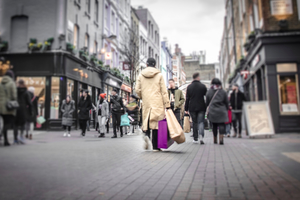Antisocial behaviour is the UK’s most feared and common crime

Over a quarter of Brits don’t feel safe at home, with antisocial behaviour (67%), burglary (52%) and cybercrime (44%) being the top three most feared crimes across the UK.
Although The Office for National Statistics (ONS) reported that crime rates dropped by 10%* in 2023, the National Crime & Community Survey conducted by Neighbourhood Watch and SimpliSafe Home Security found that a staggering 37% of Brits experienced a crime in the last year, with 63% of those having experienced antisocial behaviour, followed by physical assault (25%).
Shockingly, 58% of people who witnessed a crime over the past 12 months did not report it, with the main reason being they didn’t believe anything would be done – this behaviour was the most common among Brummies (10%).
When looking at the data regionally, Londoners experienced the highest level of crime over the past 12 months (46%), with Geordies not too far behind (44%). The South West experienced the least crime (71%), which ties with people in that region feeling the safest (81%). Those in the West Midlands, however, feel the most unsafe (37%).
Neighbourhood Watch has supported the Home Office’s work this year in trialling new policing approaches to tackling antisocial behaviour across England. The findings of this survey highlight the need for further research into why antisocial behaviour remains a prevalent crime in the country. There is also a continued need for action to be taken to prevent incidents of antisocial behaviour in communities.
John Hayward-Cripps, CEO of Neighbourhood Watch Network: “It is clear from the findings of our survey that we must continue to prioritise sharing resources and raising awareness of antisocial behaviour, burglary and cybercrime. A staggering 46% of people didn’t report a crime over the past 12 months according to the National Crime & Community Survey and 5% of those said it was because they were too scared to do so, so it’s important to help empower people to take action to protect themselves and prevent these crimes from impacting them and their communities. Working collaboratively with other organisations will be essential to help reduce crimes such as ASB in communities, and increase feelings of safety and community wellbeing.”
The charity continues to work hard to support its members with understanding how to respond to antisocial behaviour and harassment, either as a bystander or as a victim, and highlights the importance of being an active bystander. Through the Suzy Lamplugh ‘5Ds’ training, which Neighbourhood Watch encourages volunteers to take, members receive guidance on how to safely and effectively intervene, document or support the victims of these crimes. Statistics from this survey show that more than half (56%) of respondents have changed their behaviour after seeing crime prevention campaigns from Neighbourhood Watch, suggesting their guidance has had a positive impact, with people feeling equipped to take action or change their behaviours in the face of crime.




